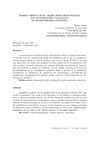Identificador persistente para citar o vincular este elemento:
https://accedacris.ulpgc.es/jspui/handle/10553/43855
| Campo DC | Valor | idioma |
|---|---|---|
| dc.contributor.author | Presas Corbella, Marisa | en_US |
| dc.contributor.author | Martín De León, Celia | en_US |
| dc.date.accessioned | 2018-11-21T18:21:36Z | - |
| dc.date.available | 2018-11-21T18:21:36Z | - |
| dc.date.issued | 2011 | en_US |
| dc.identifier.issn | 1130-5509 | en_US |
| dc.identifier.uri | https://accedacris.ulpgc.es/handle/10553/43855 | - |
| dc.description.abstract | La investigación cualitativa puede caracterizarse como un intento de descubrir el “mundo real” por oposición al mundo del laboratorio, por lo que se considera el método idóneo cuando se trata de construir una teoría. El grupo PETRA ha iniciado una nueva línea de trabajo para estudiar las teorías implícitas de la traducción. Para ello se utiliza un diseño cualitativo que combina diferentes procedimientos, entre losque cabe destacar el análisis de metáforas. En este trabajo repasaremos brevemente las aportaciones de la investigación cualitativa sobre el proceso de la traducción, discutiremos las condiciones de calidad de esta metodología y expondremos los fundamentos metodológicos de nuestro estudio sobre las teorías implícitas de traductores no expertos. | en_US |
| dc.description.abstract | Qualitative research can be characterized as an attempt to discover the “real world” as opposed to the world of the laboratory, so the method is considered ideal when it comes to building a theory. The PETRA Group has started a new line of work to study the implicit theories of translation, using a qualitative design which combines different methods, including the analysis of metaphors. This paper will briefly review the contributions of qualitative research on the translation process, before proceeding to discuss the quality conditions of this methodology as well as the methodological foundations of our study on the implicit theories of non-expert translators. | en_US |
| dc.language | spa | en_US |
| dc.publisher | 1130-5509 | - |
| dc.relation.ispartof | Sendebar | en_US |
| dc.source | Sendebar[ISSN 1130-5509], n. 22, p. 87-111 | en_US |
| dc.subject | 5704 Teoría lingüística | en_US |
| dc.subject.other | Metodología de la investigación | en_US |
| dc.subject.other | Teorías implícitas | en_US |
| dc.subject.other | Traducción | en_US |
| dc.subject.other | Research methodology | en_US |
| dc.subject.other | Implicit theories | en_US |
| dc.subject.other | Translation | en_US |
| dc.title | Implicit theories of beginner translators. A qualitative research in cognitive translation studies | en_US |
| dc.type | info:eu-repo/semantics/Article | en_US |
| dc.type | Article | en_US |
| dc.identifier.scopus | 84890951627 | - |
| dc.contributor.authorscopusid | 35201491900 | - |
| dc.contributor.authorscopusid | 24437772900 | - |
| dc.description.lastpage | 111 | en_US |
| dc.description.firstpage | 87 | en_US |
| dc.investigacion | Artes y Humanidades | en_US |
| dc.type2 | Artículo | en_US |
| dc.utils.revision | Sí | en_US |
| dc.date.coverdate | Diciembre 2011 | |
| dc.identifier.ulpgc | Sí | es |
| dc.description.sellofecyt | Sello FECYT | |
| dc.description.esci | ESCI | |
| dc.description.erihplus | ERIH PLUS | |
| item.fulltext | Con texto completo | - |
| item.grantfulltext | open | - |
| crisitem.author.dept | GIR IATEXT: Cognición, Lingüística, Texto y Procesamiento de la Información | - |
| crisitem.author.dept | IU de Análisis y Aplicaciones Textuales | - |
| crisitem.author.dept | Departamento de Filología Moderna, Traducción e Interpretación | - |
| crisitem.author.orcid | 0000-0003-4548-9033 | - |
| crisitem.author.parentorg | IU de Análisis y Aplicaciones Textuales | - |
| crisitem.author.fullName | Presas Corbella, Marisa | - |
| crisitem.author.fullName | Martín De León, Celia | - |
| Colección: | Artículos | |
Citas SCOPUSTM
8
actualizado el 08-jun-2025
Visitas
243
actualizado el 16-ene-2026
Descargas
122
actualizado el 16-ene-2026
Google ScholarTM
Verifica
Comparte
Exporta metadatos
Los elementos en ULPGC accedaCRIS están protegidos por derechos de autor con todos los derechos reservados, a menos que se indique lo contrario.
